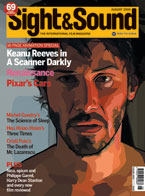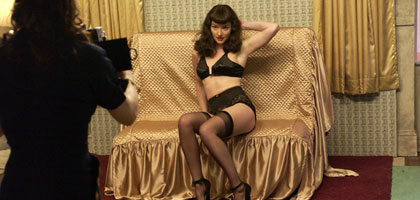Primary navigation


The ravishment is principally visual in Mary Harron's otherwise discreet biopic of a female icon of 1950s sexuality. But is the film just another rose-tinted vision of the pre-video sex industry, asks Linda Ruth Williams
Buried within the opening shots of The Notorious Bettie Page is some documentary footage of 1950s New York: big city, bright lights, and a cinema advertising The Wizard of Oz. From the bare threads of 1950s pin-up Bettie Page's lurid story, director Mary Harron has woven a cinematic tale that could have been fashioned by Frank Baum himself.
Bettie Page was a brunette in an age of blonde bombshells, and is now a camp icon of 1950s sexuality. She was both prime cheesecake and - more famously - goddess to those seeking less mainstream satisfactions. In 1957 she gave her heart to Jesus and disappeared from public life. Then in the 1980s, her back-catalogue of fetish modelling was rediscovered and elevated on to its current kitsch pedestal.
Harron's glorious biopic of the queen of softcore bondage, which focuses on the period up to 1957, could easily have been a retro-romp of epically camp proportions. Instead it is a visually ravishing investigation of a life lived with an innate sense of decorum. Gretchen Mol, walking tall in Page's nine-inch heels, plays the heroine as a demure southern belle (Page was from Tennessee), an innocent abroad, unshockable and willing to give most things a go but anchored by her personal modesty and belief in God. However many clothes she strips off, she never loses her manners or her faith. Mol's subtle performance is a portrait of 'restraint' in more ways than one.
As Harron's film reveals, Bettie Page had two parallel photographic careers. There is the Bettie of mildly racy gentlemen's magazines with titles like Wink, Bachelor and Beauty Parade, their pages filled with bikinied babes saucy with suggestion. On one cover a scantily clad model tosses a pancake, taking kitsch into the kitchen. These girlies smile accommodatingly, look the punters in the eye and make them feel good about what they're doing. As Harron's beautifully detailed photo-shoot scenes indicate, Bettie pulled this off brilliantly and seemed to be having fun, even when she snarls or poses with leopards for the photographer and model Bunny Yeager (who got Bettie her only Playboy centrefold in 1955). Then there is the Bettie who hooked up with photographer-distributor double act Irving and Paula Klaw. The Klaws took Bettie under their wing and introduced her to the world of fetish for which she is now more famous, supplying 'naughty' material for (then) underground tastes. "Shoes and boots, boots and shoes - can't get enough of them," exclaims Paula to the initially incredulous Bettie.
Harron's film shows other Betties, too: God-fearer, aspiring Method-tutored actor - but, surprisingly, rarely an exploited victim. Once Bettie has departed a grey Tennessee of abusive fathers and gang-rapists, her world is all good clean fun. Harron makes great play with cinematic and pop-cultural quotations, the Wizard of Oz touchstone allowing her to switch headily between noirish monochrome and melodramatic colour. At one point a live-action Bettie jiggles and wiggles within a still magazine frame whose cover asks "Are Sex Dreams Normal?" The meticulously crafted ambience is filtered through genre-inflected visuals: as Bettie poses with leopards for Yaeger, the colour burns with Sirkian intensity. Even the noirish, black-and-white styling of 1940s and 1950s New York takes on the racy panache of a fast-paced policier, accompanied by a rinky-dink soundtrack supplied by Artie Shaw and Charlie Mingus. Bettie smiles her way through a bebop fantasy: more Oz than Gotham, this New York is a place where some dreams come true.
If there's a villain, it's Senator Estes Kefauver, who leads hearings into whether pornography causes juvenile delinquency. The prosecution's evidence is far more salacious - exploitative, even - than the 'honest' goings-on in the Klaws' industry, and is peppered with absurdities: "Communism will never defeat America," says a priest. "It's something from within." By contrast, the world of the fetish producers comes across as a haven of support and camaraderie: models look after each other, and the Klaws function as mom-and-pop figures. It helps that the Klaws are played by Chris Bauer and Lili Taylor, the latter a Harron veteran who starred as Valerie Solanas in I Shot Andy Warhol (1996). Jared Harris, who played Warhol in that film, is hilarious as dissolute British fetish photographer John Willie.
But the sexual liberalism of The Notorious Bettie Page might be a little too easy. Over a montage of a semi-naked Bettie frolicking in the surf, Yaeger's voice reads the accompanying magazine copy, highlighting the model's enjoyment of her own naturalness: she is "nude but not naked". In a sense Harron's whole film takes its cue from these words, offering the justification of wholesomeness in its contention that Bettie did what she did because it felt good and she hoped it helped people. I'm not wishing exploitation on Bettie (though she surely earned less than the Klaws), but aren't we becoming tired of nostalgia movies about the sex industry that view the pre-video past as a world of happy families and consensual pleasures? The Super 8-style home movies here of country-house romps (showing the Klaws shooting titles like Sally's Punishment and Second Initiation of the Sorority Girl to the accompaniment of Peggy Lee's 'It's a Good Day') are funny and heart-warming. But the notion that back then fashions were cooler, sex was hotter and everyone looked after each other is wearing a bit thin. Films such as Boogie Nights and Inside Deep Throat presented the 1960s and 1970s sex industries as the happy fumblings of a cottage enterprise; in Harron's film the 1950s fetish scene is represented as the triumph of the little man's championing of an 'it takes all sorts' attitude. It's entertaining, but there's a whiff of 'over the rainbow'.
The Notorious Bettie Page is not the first biopic of this much-loved icon, and it probably won't be the last. Bettie Page: Dark Angel (2004) was a straight-to-DVD account of the last three years of Page's career, but neither that film nor Harron's probes her self-imposed exile. (Page is now 83, and publicity-shy; she reportedly didn't know anything of her post-1960s rediscovery until it was well under way.) Rather than conjecturing about psychological motivation and damage, or about the post-fame years, Harron takes her good-natured heroine at face value and reads her story in the context of national sexual prejudice as well as underground sensual pleasure. This means that in spite of the lurid subject matter, the narrative is slight: Bettie moves from tough beginnings to sexual celebrity, and then to God (her 'Emerald City/return to Kansas' moment) via a bit-part in a senatorial investigation.
Bettie Page circa 1955 suggests one formation of American sexuality; Bettie Page for the 1990s and beyond, quite another. By the time Madonna donned a cone-bra, Page had become a commodity of postmodern sexual nostalgia, combining the illusion of an innocent prelapsarian sexuality with sharp 1950s stylings and lashings of innuendo which, courtesy of mainstream borrowers like Jean-Paul Gaultier and the Skin Two brigade, had become freshly cool. Harron's clever movie manages to bypass all that while having fun with the styles and the sounds: the mood music is pitch-perfect, the design - from the most inconspicuous lampshade to Bettie's corsets - impeccable.
But this Bettie is more a product of cinema history than a sexual pioneer out-of-time. Perhaps the Wizard of Oz references signal Harron's own movie-nostalgia; perhaps she simply figured out that Judy Garland and Page were born within a year of each other and that Page's 1930s Nashville must have felt a bit like Dorothy's monochrome Kansas. Page is compared to peroxided sex icons Monroe and Mansfield, but Garland might be a more appropriate alter ego, particularly given her own reinvention by camp. Harron's heroine makes several attempts to break through to mainstream acting, failing a stage audition when the producer recognises her as "the notorious Bettie Page". Given different circumstances, the film implies, Bettie might have become Judy, and Judy Bettie.
Asked - while posing spread-eagled in bondage - "What do you think Jesus would say about this?", Bettie displays a wide-eyed ingenuousness befitting Dorothy: "God gave me the talent to pose for pictures, and it seems to make people happy." The Notorious Bettie Page may be nothing but a series of beautiful poses, but audiences will be more than happy with the result. As Julie London croons 'Gone with the Wind' over the final credits, this latter-day Dorothy Gale is blown beyond the moment she came to epitomise. Harron's sweet-natured model, buffeted by fortune, finally discovers there's no place like home.